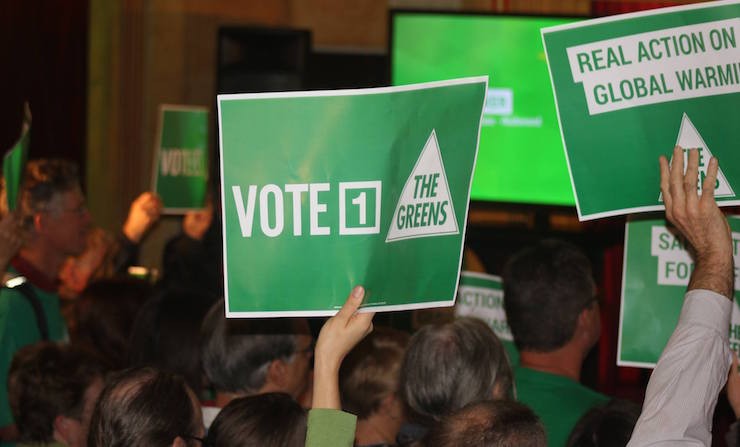Faced with an upcoming election, you might think the Greens NSW are focussed on a united campaign to win seats. But that’s not the case, writes Michael Brull*.
For months, there has been a steady campaign of wrecking against and undermining of the Greens NSW, conducted by the right of the party, and its recently departed MP, Jeremy Buckingham. This campaign has been conducted with the support of the corporate media, which has taken every opportunity to print just about every complaint, leak, and negative opinion.
Earlier this month, Sydney Morning Herald reporter Lisa Visentin wrote a story revealing that former leader of the Australian Greens, Bob Brown, had held talks with the Greens NSW right-wing upper house MPs about splitting and forming their own party.
The MPs in question were Jeremy Buckingham, Dawn Walker, Cate Faehrmann, and Justin Field.
Brown says he advised against splitting from the party, as a separate Greens party couldn’t form in NSW and still be part of the Australian Greens. The discussions “intensified” in November.
According to Visentin, “As the talks continued throughout the second half of last year, a confidential discussion paper outlining the rationale for a split was circulated between the group of MPs and their close supporters.”
The paper in question complained that the party was “dominated by factionalism and personalities”. Furthermore, there “is a considerable ideological divide between the party [on]ideological communism and ecological realism”. They wanted a “fresh approach that discards the accumulated discord associated with the NSW Greens and Lee Rhiannon”. Thus, if they created a new party, they could pursue policies under “a mixed-market economy and parliamentary democracy framework” with a “reinvigorated focus on environmental issues and campaigning”.
Consider what this means. From August, four upper house MPs in NSW were having talks about splitting from the Greens NSW. Their argument was that the party was “dominated by factionalism”, an “ideological divide” between communists (read: the left of the party) and ecological realists (the right of the party). If they were to start a new party, they would embrace a “mixed-market economy”, with a “reinvigorated focus on environmental issues and campaigning”.
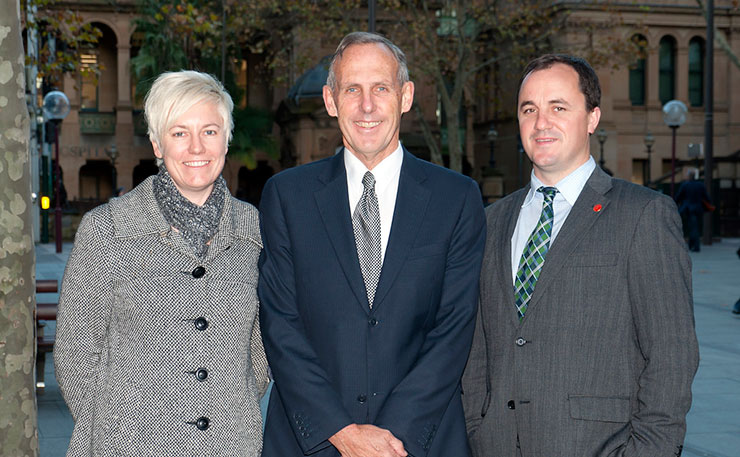
For anyone with a sliver of critical scrutiny, the implications should be obvious. The MPs in question are a faction. They are part of one ideological divide, and they think they should “focus on environmental issues”. The story shows clearly: they form a cohesive faction around a group of politicians, they have a particular political agenda and vision for the party, they organise around it internally. And somehow, they still complain about “factionalism”, that terrible thing practiced by the other side of the “ideological divide”.
The right-wing faction of the Greens NSW
Within the party, it is no secret that the right works intensely along factional lines. On one occasion, this was exposed within the party. A key organiser for the right inadvertently posted on a social media group – a heavily censored group set up by the right faction of the party to promote their messages and exclude leftists – a strategy document for the right.
It was a spreadsheet, featuring the various positions people could be elected to within the party. It colour-coded people in the party as yellow, green, or red. Green meant that someone was aligned with the right. Left was marked red.
Those marked red included known veterans of the left, such as Geoff Ash and Hall Greenland. The green included Dawn Walker, Jarah Crook, the registered agent and contact for her preselection campaign, and Max Phillips, who is a staffer of Jeremy Buckingham.
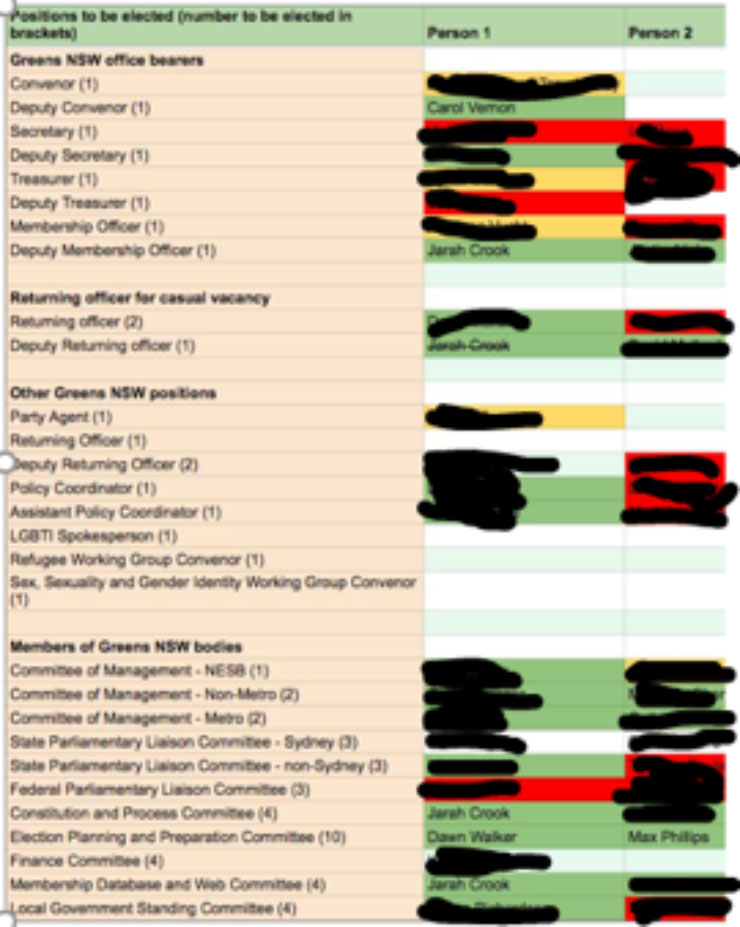
This is just an excerpt. It listed more positions, and “Person 1” extended through to “Person 13” in some cases. The document was edited by multiple people. One of those people were colour coded in this document as green.
One might think this banal – people on the right of the party worked to support others on the right in the party, and elect their comrades to various positions. Yet the right constantly denounces the left in the party as factional. They have also taken this line publicly.
For example, when former greens staffer Ella Buckland accused Jeremy Buckingham of sexual harassment, the response from Buckingham was to insinuate that this was a factional conspiracy. As seen in the planning document, they reportedly complain that the party is “dominated by factionalism”. They reject factionalism, this grouping of ideologically cohesive MPs, who reject what they label as their communist opponents, who want to found a splinter party focused on environmental issues. They are not only non-factional, they are opposed to factionalism.
The wrecking campaign
On December 8 and 9, delegates of over 50 local groups finally reached consensus on a proposal about the party and Jeremy Buckingham. The proposal requested that Jeremy Buckingham stand down from his position on the electoral ticket in 2019. It made this request, as Buckingham has repeatedly issued legal threats in response to attempts to hold him accountable for alleged misconduct.
For example, in response to a complaint being made about his criticisms of the party on the ABC, he sent a legal threat to prevent the complaint from being assessed.
When considering disendorsing Buckingham, senior figures in the party were not sure that there was any kind of constitutionally valid process for disendorsing a candidate. This seemed like a startling oversight for such a long-established party. Thus, the resolution that was finally passed went no further than requesting that Buckingham stand aside. Passed by a consensus of the party – literally not a single local group blocked the resolution – this was a stunning repudiation.
In a party which indeed has factional divides, the party agreeing that Buckingham had to go was a sign of how the membership had come to view his behaviour. This included his public insinuations about Ella Buckland.
For example, the Australian Greens complained that a media statement by Buckingham breached sexual harassment policy about “victimisation or retaliation” against complainants. They requested that he apologise for what he said. On 13 November, they gave up on resolving this issue, “due in part to Mr Buckingham’s ongoing behaviour”.

Buckingham circulated a confidential summary of the findings of the report to local groups. He also threatened to sue Ella’s supporters for defamation.
When Buckingham finally did leave the party on 20 December, he continued denouncing it. He claimed the party was toxic, anti-democratic, dominated by socialists and more. His allies, Greens MLCs Dawn Walker, Justin Field, and Cate Faehrmann all responded to his resignation from the party by celebrating him as a person, and all but endorsing his electoral campaign, which would be fought against the Greens.
For example, Field said “Australian politics needs people like Jeremy Buckingham and the planet would be much better off with him back in the NSW Parliament… I wish him well on the campaign.”
This photo, reportedly from January, shows no hard feelings among the group.
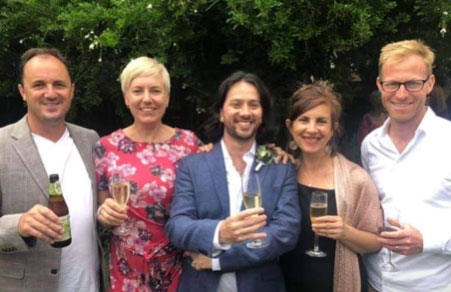
Among the manoeuvres of this group has been calling for Walker to be installed higher up in the electoral ticket for the state election in March. In the preselection last year, David Shoebridge from the left triumphed. The second spot is reserved for a non-male candidate, and so his preferences put Abigail Boyd from the centre-left over Walker on the right. Buckingham followed in third spot, followed by Walker in the fourth spot.
When it looked as though Buckingham might be ousted in the December State Delegates Council, right-wingers in the party pushed a late proposal, urging that if Buckingham left the party, that preferences that had gone to Buckingham be re-distributed.
This process has no precedent in the party, and has no grounding in its processes or constitution. To gain substantive discussion, the proposal needed 75 per cent of delegates to support discussion. It failed at this first hurdle, and was summarily dismissed from the agenda.
Dawn Walker then began campaigning for this decision, made by delegates of local groups around the state, to be overridden by senior figures in the party. Her camp leaked one such letter making this demand to the Guardian. Her position for the public was that this kind of veto was the democratic thing to do.
As Walker is aligned with Buckingham, it is generally considered that Walker would benefit from receiving his preferences, and thus would go from last spot to second. Though the Greens have elected three upper house MPs in the past, it is regarded as more realistic that the Greens could get two spots in the upcoming election.
The thinking of the right faction was more or less outlined in this article in Saturday Paper, which mostly uncritically reprints interviews with Buckingham and his right-wing allies. Mike Seccombe writes that a section of “the party wants (Boyd) replaced by Dawn Walker, also a sitting MP, on the basis that, with Buckingham gone, his preferences give Walker more votes than Boyd.”
Think about what this means. Since August last year, Dawn Walker has been part of a group of four MPs who have actively discussed splitting from the party, and who intensely discussed it from November last year. Walker is demanding that she be moved up the electoral ticket since the departure of Buckingham, so that she can benefit from the Greens brand, campaigners, volunteers and electoral machine in March. If she’s elected, she may then leave the party.
This demand for a redistribution of preferences was supported by Justin Field and Cate Faehrmann. They “require[d]a binding agreement” from the Greens NSW by 17 December that the party redistribute Buckingham’s preferences, and expel and ban two socialist groups from the party. Otherwise, well, they would let the public know that “we are giving serious consideration to whether we can continue as members of the NSW Greens”.
As is now public, they had already been considering leaving the party, as they had discussed it with Brown since August.
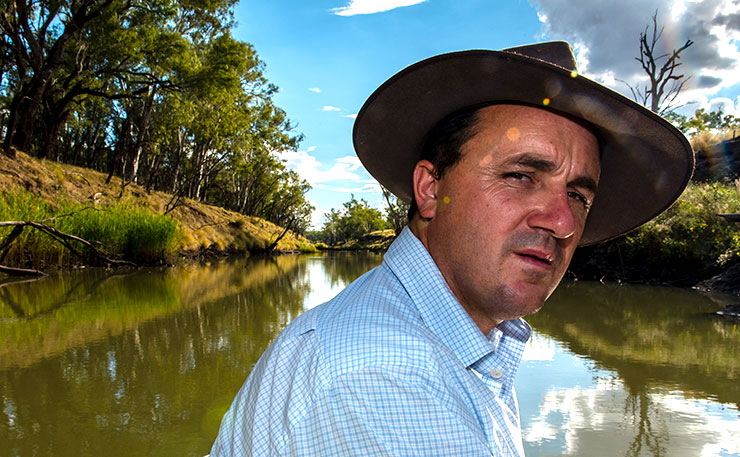
It should be stressed when the discussions began. On 2 August, ABC reported Ella Buckland’s allegation that Buckingham had sexually harassed her. At some point in August, Bob Brown met with the four right wing MPs, and they discussed splitting from the party. No explanation was offered in relation to this curious timing, or if there was a connection between the two events.
In November last year, there were five Greens members of the state upper house. Four of them were on the right of the Greens. With the departure of Buckingham, there are now three – Buckingham’s allies. Though all serve as elected representatives, none of them has ever won an election.
Justin Field is an MLC because he won the preselection for a casual vacancy after John Kaye died in 2016. Dawn Walker is an MLC because she won the prelection in 2017 after Jan Barham resigned. Cate Faehrmann is an MLC because she won the preselection after Mehreen Faruqi stood down from her seat in state parliament, to replace Lee Rhiannon in the Federal Senate.
Faehrmann has twice become an MLC without the work of an election, having previously won preselection in 2010, after Lee Rhiannon stepped down to serve in the federal senate.
The three remaining right-wing upper house MPs are there because of their strength in organising within the party internally. Activists and volunteers in the party fought to earn the Greens seats in the state parliament.
Faehrmann, Field, and Walker rode those successes to six figure salaries, offices, staffers and volunteers. They aggressively stood by Buckingham. For example, when Member for Newtown Jenny Leong accused Buckingham of behaving towards her in an aggressive and intimidating manner, Field claimed that this was “first and foremost an opportunistic effort to destroy”, an “orchestrated political hit”, and dismissed her claims as “hearsay and innuendo”.
Field and Faehrmann’s seats – won by Faruqi and Kaye – will hold for a few more years. Walker’s seat is up for grabs in March. To win it, the Greens would need to run a strong campaign. Yet the faction of right-wing representatives has regularly leaked to the media. They continue to trash the party. None has even gone through the motions of denying that they have discussed splitting from the party. None has even denied that they might do so in the future.
They are sabotaging the chances of the party to win a third seat, seeking to move Walker up to second spot, and offering no assurances that Walker, Field or Faehrmann will stay in the party after the elections. Is it imaginable that any other political party would put up with this kind of behaviour?
Of course, much of the right’s agenda is hypothetical. There is virtually no support in the party for Walker’s vote redistribution demand. It was dismissed from the meeting agenda in December. The ultimatum by Field and Faehrmann wasn’t supported by one single local group in the entire state.
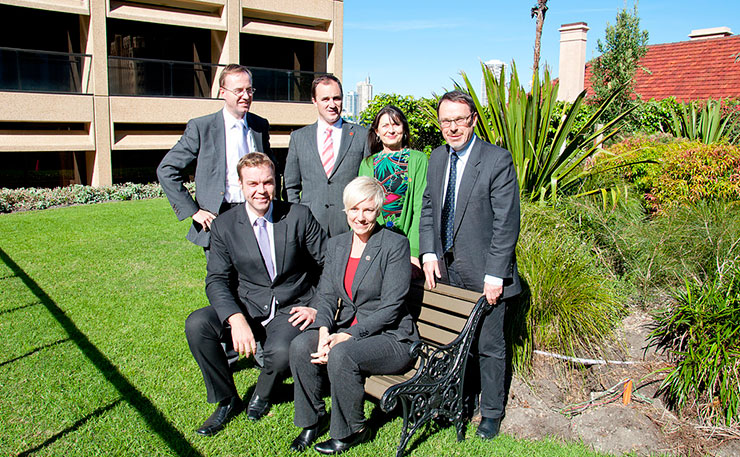
They had a petition in support of their demands, which was signed by about 500 people, about 300-350 of them members of the party. This represents less than 10 percent of the party. That is, though the right dominates the political leadership positions, they have vanishingly little support for their factional agenda, such as demanding the summary expulsion and banning of a socialist group.
Yet the leaks and wrecking continue. There have been numerous stories against the party in the Guardian, Australian, Fairfax, and Saturday Paper. The party is undemocratic for not moving Walker up the electoral ticket, and for reaching consensus that Buckingham should go. It should embrace procedural fairness, and purge the socialists.
In a differently run party, we might see Walker, Faehrmann and Field kicked out, their spots taken by people loyal to it. Instead, the trio continue to publicly back Buckingham, demand that Walker be advanced on the electoral ticket, and privately consider if and when they’ll split from the party.
This state of affairs is incredible. If the right-wing MPs are not even willing to pretend to commit to staying in the Greens, then how can they be allowed to stay in the party? How can they repeatedly work against it in the media, without any kind of sanction? How can an MP dismiss another MP’s claim of being intimidated by calling her claims ‘opportunistic’, amounting to nothing more than ‘hearsay and innuendo’?
Part of the problem is structural. The Greens NSW do not have the means to discipline rogue MPs. Hence, the protracted attempt to rein in Jeremy Buckingham. Hence, the consensus of the local group delegates that Buckingham should be asked to stand down as an electoral candidate, rather than dis-endorsing him.
The Greens NSW are currently reviewing their constitution and processes, and this is one of the major issues that cries out for reform. Yet any reform will require the support of 75 per cent of local groups, and Faehrmann and Field have already made clear they are opposed to MPs being accountable to the party.
The current wrecking campaign is ruining the election campaign, which is led by a candidate each from the left and centre left. Yet when the election is over, the conflict over party processes is set to continue.
And when the right doesn’t get its way, and even faces a threat of accountability to the party, we can expect more leaking to the media.
* Michael Brull has been a member of the NSW Greens for about 18 months. He leans towards the left of the party. He does not hold any formal role in the party, nor has he ever performed any paid role.
Donate To New Matilda
New Matilda is a small, independent media outlet. We survive through reader contributions, and never losing a lawsuit. If you got something from this article, giving something back helps us to continue speaking truth to power. Every little bit counts.

